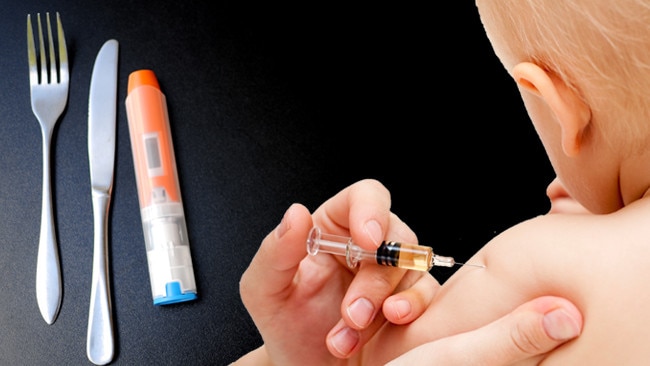Trial aims to see if old whooping cough vaccine offers extra protection against food allergies
The number of Australian children with food allergies has risen dramatically since the late 1990s — the same time as a new vaccine came into use. Now researchers are recruiting up to 3000 babies across the country for a trial to see if the two are linked.
VIC News
Don't miss out on the headlines from VIC News. Followed categories will be added to My News.
EXCLUSIVE: The number of Australian children with food allergies has risen dramatically since the late 1990s — the same time a new whooping cough vaccine came into use.
Melbourne and Perth researchers are recruiting up to 3000 babies across the country in a $4 million clinical trial to see if the two are linked.
The theory is that the older whole-cell vaccine could be better at training the baby’s immune system to later ward off allergens.
VIC FOOD SHOPS PUT ON NOTICE OVER ALLERGY RISKS
ANAPHYLAXIS RISK IN PACKAGED FOOD
FOOD ALLERGIES: RISE OF AN MODERN EPIDEMIC
The previous vaccine was replaced by a new acellular version on the national immunisation schedule by 1999, following widespread reports of minor side effects such as fever and pain at the injection site.
Following this vaccine change, there was a rise in hospital admissions among infants suffering anaphylactic reactions to foods.
Lead researcher Associate Professor Tom Snelling, from Curtin University and Telethon Kids Institute, said studies at their institute found that very few of the infants who received the old vaccine had immune responses in their blood typical of those who would later develop allergies. This led them to suspect that vaccine could be protective.
“We think one dose could be enough to train the immune system away from allergies, with those first few months crucial to prime the immune system,” Associate Prof Snelling said.
“The immune system has to quickly mature in the first few months of life after birth, so it’s more suited to protecting against infection.
“This normally happens by being exposed to infections
“Because we live in much cleaner environments, kids don’t get the same exposure to infections as they used to, so that may be why we’re seeing a lot more allergies.”

Melbourne remains the food allergy capital of the world, with more than 7,000 children born each year going on to develop food allergies as toddlers.
Across the country, 10 per cent of infants will be affected, typically to nuts, milk or egg, by their first birthday.
More than 50 babies from Perth have already been signed up to the trial, which has been funded by the National Health and Medical Research Council.
Researchers from Murdoch Children’s Research Institute are also be involved in the project, with infants from Melbourne, Sydney, Adelaide due to be enrolled by the middle of the year.
They will be followed up at 18 months of age to see if they have food allergy symptoms.
Prof Snelling said if their theory was proved, the findings would have implications for other related allergic diseases such as asthma and eczema.
MORE NEWS:
KENNEDY SPLURGES ON RACEHORSES AS BIZ FLOUNDERS


